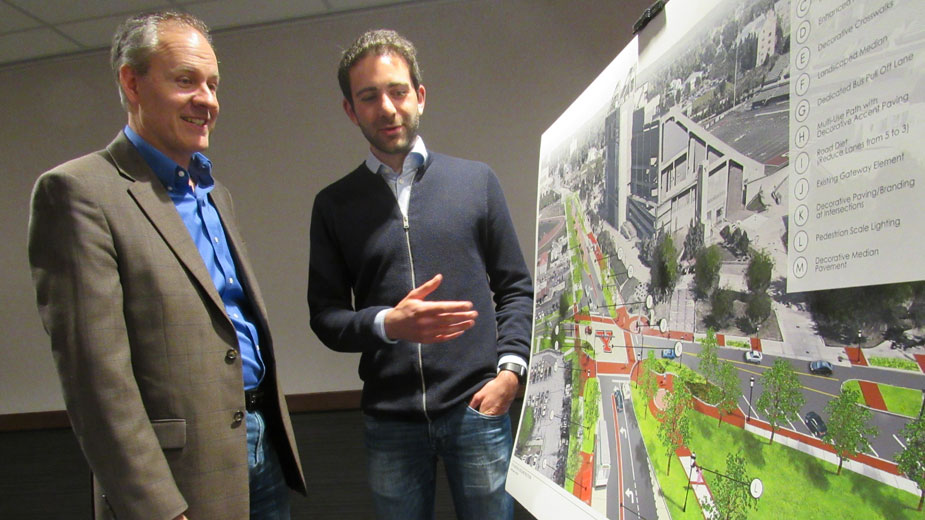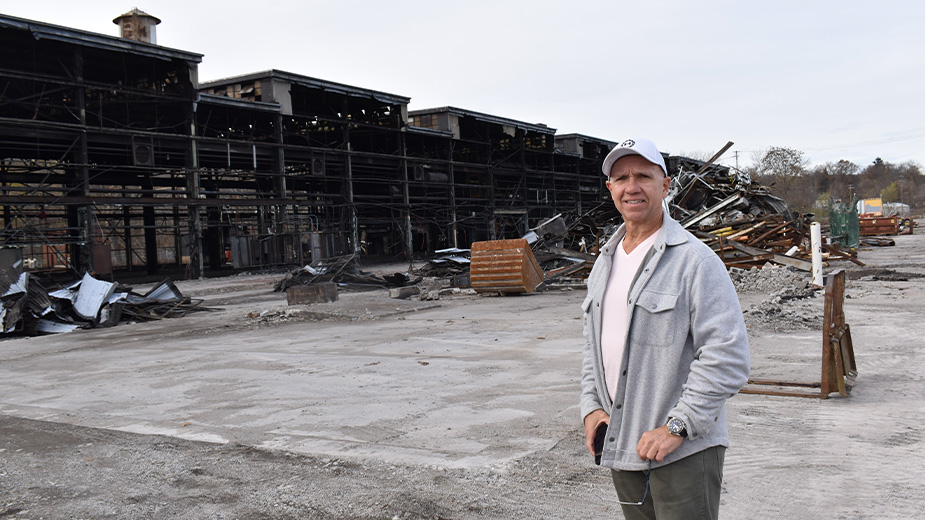German Delegation Gets Close Look at Tech Transition
YOUNGSTOWN, Ohio – Denes Kuecuek is well aware of the striking similarities between his hometown of Dortmund, Germany, and this city.
Both were once industrial giants – Youngstown as the steel-producing behemoth of the Mahoning Valley and Dortmund as a coal and steel center of the Ruhr Valley.
Today, both cities are in the midst of a transformation, a notion that wasn’t lost on Kuecuek as he and five other professionals from Germany spent the day exploring how Youngstown is embracing the digital age in preparation for its future.
“I think we have the same problems and the same challenges,” Kuecuek said. “It’s interesting to see how you handled these changes.”
Kuecuek, the deputy head of Dortmund’s chief information office, noted there’s an initiative underway to redevelop the city with “smart” technology. That is, employ the full scope of digitization and information technology to impact everything from municipal services, transportation and communications.
“We are facing questions about how we can manage traffic and how we can make Dortmund a more livable place,” he said.
The six-member delegation is part of an effort by the New York-based American Council on Germany that seeks to broaden dialogue between the two countries and share ideas on how to close the technological gaps that stunt regional growth. The group included education specialists, information technology experts, and government agencies. Four were from Dortmund, while two others resided in Darmstadt, a city further south near Frankfurt.
The group arrived in Cleveland Sunday and toured that city, visiting development organizations such as Team NEO, technology workforce training initiatives at Cuyahoga Community College, and the Digital Excellence Initiative at the Cleveland Foundation and he Manufacturing Advocacy and Growth Network, or Magnet.
On Wednesday, the delegation arrived in the Mahoning Valley, visiting Center Street Technologies in Youngstown, the Tech Belt Innovation Center in Warren, Vista AST2 and Eastgate Regional Council of Governments.
At Eastgate, the group was presented details about Youngstown’s plans for its SMART2 Network – a $26 million effort to revitalize Fifth Avenue near Youngstown State University and surrounding neighborhoods. A component of the plan calls for the introduction of autonomous shuttles along a prescribed route along the corridor.
Officials hope work on the project could begin by 2020 and completed by 2022.
Today, the delegation is scheduled to visit America Makes and YSU’s Center for Innovation in Additive Manufacturing before departing for Pittsburgh.
“What impressed me the most,” Kuecuek reflected, “was that you’ve landed on your feet despite these challenges.”
Robert Fenstermacher, chief content officer for the American Council on Germany, said his organization was approached by the German Embassy to put together a program on the digitization and the future of work.
“There was a recognition that it’s an issue in Germany as well as here,” he said. The organization put together an application to the German Economics Ministry, which administers a fund for overseas projects.
The result was the Transatlantic Cities of Tomorrow: The Digitization and Future of Work, a program that features four sets of exchanges between 12 German cities and 12 cities in the United States. Youngstown was selected as one of the cities on the first phase of the program, Fenstermacher said.
“They’re meeting with their counterparts to look at all aspects of digitization such as Smart Cities, workforce training, digital literacy for kids. All of those issues combined as one,” he said.
The Council’s objective is to bring German and Americans together without the baggage of international politics and discuss these matters, Fenstermacher said. “We want to look for issues where we can be sharing best practices and overcoming challenges together.”
Four officials from Youngstown – Barb Ewing, CEO of the Youngstown Business Incubator; Genna Petrolla, economic development planner for Eastgate; DeMaine Kitchen, president of Youngstown City Council; and Mike Hripko, associate vice president for external affairs, government relations and economic development at YSU – will travel to Germany at the end of June for one week in a reciprocal visit.
“Germans are doing Industry 4.0 better than anybody else at this point,” Ewing said. “There are a lot of things we can learn and gain from this, and position ourselves for these coming changes.”
Ewing noted that in the past, many companies failed to embrace the technological changes in the steel industry and the result was an economic disaster for the entire community.
The exchange presents two opportunities for the Mahoning Valley, Ewing said. First, it helps companies understand how technology is altering manufacturing throughout the world – from 3D printing to robotics. Second, it can help identify new markets and new companies that can expand and grow with this technology, she said.
“I don’t want people 50 years from now looking back and saying why wasn’t more done,” she says. “This is a new industry and we can be at the forefront of it.”
Pictured: Robert Fenstermacher, chief content officer for American Council on Germany and Denes Kuecuek, Dortmund’s deputy head of chief information, look at renderings of the SMART2 Network in Youngstown.
Copyright 2024 The Business Journal, Youngstown, Ohio.



